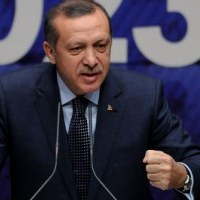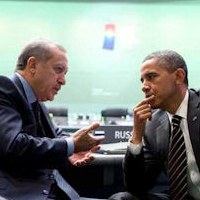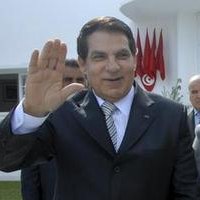![]()
Sun, Nov 28, 2010 | Cablegate

WikiLeaks: Strong Pushback On the Turkey-Armenia Normalization
Thursday, 25 February 2010, 08:15
C O N F I D E N T I A L SECTION 01 OF 04 BAKU 000134
SIPDIS
EO 12958 DECL: 02/24/2020
TAGS PREL, PHUM, MARR, ETRD, AJ, AM, RS”>RS, IR, TU
SUBJECT: AZERBAIJANI PRESIDENT TO U/S BURNS: “YOU CAN’T
BOIL TWO HEADS IN ONE POT”
Classified By: Charge Donald Lu, for reasons 1.4 (b,d).
1. (C) Summary: President Aliyev used this coarse street slang to describe the relationship between Russian President Medvedev and PM Putin, but he might well have used the same idiom to describe his concerns about Turkey-Armenia reconciliation and the Nagorno-Karabakh (NK) Peace Process. He told U/S Burns that the “Sword of Damocles” of the April 24 Armenian Remembrance Day is hanging over the NK Process, as well as the Turkey-Armenia normalization process. He suggested that it would be easier if the Turkey-Armenia normalization could be considered after April in order to allow more time for progress on NK. He also took the opportunity to press the USG to apply maximum pressure on Yerevan to make concessions on NK. He stressed, “Now we are trying to be even more flexible.”
2. (C) Summary Continued: On Iran, President Aliyev said he supported economic isolation and believed it could be effective if enforced by a broad coalition. He complained about Iranian security provocations. On a proposed battalion-sized Afghanistan contribution, Aliyev said that he would support sending a team to Georgia to observe the training being provided by EUCOM to Georgian troops headed for Afghanistan. On energy cooperation, President Aliyev said that if the Turks demonstrate “constructive behavior” this year that a gas transit deal can happen. Finally, on the jailed youth activists, though he made no firm commitments regarding their release, he said, “I think (a pardon or amnesty) can be done. I had no intention to hurt anyone.” End Summary.
Seeks Pressure on Yerevan to Resolve NK
—————————————
3. (C) Under Secretary of State for Political Affairs Bill Burns began his hour-long meeting with President Ilham Aliyev by stressing that he was sent with the simple message that Washington wants to build our bilateral relations and create a stronger partnership. He then offered his condolences for the three Azeri soldiers killed on the Line of Contact on February 18. Aliyev responded that such events show that there is no peace, no peace treaty and no peacekeepers enforcing the cease-fire. He worried more such incidents could happen. Burns commented that such incidents underscored the urgency of finding a political solution on Nagorno-Karabakh.
4. (C) The balance of Aliyev,s comments sought to convey that he was ready to move forward in the Minsk Group Process, but that international pressure would be needed if Armenia was to move forward. He said that it is now time to find a final resolution, but Armenian President Sargsian wants to walk away from the process. “I told the co-chairs that Armenia wants to delay as long as possible and escape at the end.”” He said that Azerbaijan was prepared to do its part to propel the talks forward. “Now we will try to be even more flexible.”
5. (C) Aliyev outlined several steps to persuade Armenia to agree to the Minsk Group Basic Principles:
— the three co-chair countries should consolidate their efforts at a senior-level,
— (C) the three co-chair countries should send a strong message that the independence of NK is not under review, and
— (C) if these new proposals are not accepted, there should be consequences in terms of international isolation, especially in the form of Russia,s curtailing some of its economic support for Armenia.
6. (C) Aliyev noted that at Sochi, President Sargsian had inserted a proposal for specifying a definite date for a referendum or plebiscite on NK final status. This, Aliyev argued, undermined the entire framework of the agreement, which is premised on an eventual referendum ) with no definite timeframe ) in exchange for legalizing “the illegally established regime in NK.”” He also noted that Armenia is vulnerable to isolation because it is dependent upon remittances from its diaspora, as well as imports of gas and electricity. “After 18 years of negotiation, we have tested all options. If this phase (of Minsk Group talks) ends, what is next?” the President asked aloud.
The Russian Role in NK and Russian Succession
BAKU 00000134 002 OF 004
———————————————
7. (C) In response to U/S Burns’ question about the Russian role in the NK talks, Aliyev responded that he was convinced that Medvedev’s efforts have been sincere. He said that Medvedev has personally met with the Azerbaijani and Armenian presidents five times. Thus any failure to make progress on this issue will damage Medvedev’s credibility. He said that at Sochi, Medvedev tried to persuade Sargsian to achieve a breakthrough. He added, however, that it was strange that with so much pressure from Moscow and Lavrov’s visit to Yeveran, the Armenians not only resisted progress, but actually backtracked on previously-agreed items. In response to a question, Aliyev said that he believes that PM Putin has his own separate opinion about the desirability of an NK resolution. “I have no evidence, but I can feel this,” Aliyev remarked.
8. (C) Aliyev said that he considers Medvedev “a modern, new-generation intellectual,” surrounded by people whom he does not control. He said that he has personally witnessed Medvedev taking decisions that then required further approval before they were implemented, referring specifically to a border demarcation agreement that he had agreed with Medvedev only to have it stymied by “”others,”” presumably in the prime ministerial office. He added, “Many high-ranking officials don’t recognize (Medvedev) as a leader.” He said that there are signs of a strong confrontation between the teams of the two men, although not yet between Putin and Medvedev personally. “We have a saying in Azeri, ‘Two heads cannot be boiled in one pot'” (crude street slang suggesting that two leaders are spoiling for a fight).
Strong Pushback on the Turkey-Armenia Normalization
——————————————— ——-
9. (C) U/S Burns stressed that the U.S. believes that progress on the Turkey-Armenia protocols could create political space for Sargsian to be more flexible on NK. He continued that the reverse was also true, that a failure of the Turkey-Armenia process would almost certainly result in serious negative consequences for the NK process. Aliyev said that NK progress would require a minimum of five or six months. He suggested that the entire Turkey-Armenia protocol ratification process be delayed until after April 24. He said that the “Sword of Damocles” of Armenian Remembrance Day is hanging unhelpfully not only over the Turkey-Armenia process, but also now the NK progress. “If there were no deadline, maybe we could see how to combine our efforts (to resolve NK).”
10. (C) Aliyev pushed back with his usual warnings about the negative effects of Turkey-Armenia protocol ratification without being proceeded by NK progress. He darkly predicted postponement of any NK settlement; no comprehensive regional security improvement; damage to Turkey-Azerbaijani relations; no real partnership between Turkey and Armenia; further isolation of Central Asia; the undermining of energy projects; and damage to Georgia, both in lost transit income, but also in its role as the sole land corridor between Russia and Armenia.
Relations with Iran Described as Tense and Unstable
——————————————— ——
11. (C) U/S Burns explained in detail the steps the U.S. had taken to initiate dialogue with Tehran and support the Tehran Research Reactor initiative. He ended by noting that, given the rejection of these overtures, the U.S. would move forward with another UNSC resolution that included new sanctions targeting the Iranian Revolutionary Guard Corps. Aliyev responded that although the visible side of Azerbaijan’s relations with Iran appears normal, the substance was very different. “I do not exclude that relations will be become more difficult,” the President added.
12. (C) “(German Chancellor) Merkel was very firm with me on Iran, trying to persuade me. I told her, ‘No need,'” the President recalled. He said that he was supportive of Iran’s economic isolation and believed it could work if the international community worked together. He said that earlier sanctions observance had been spotty with many European energy companies working in Iran. “Statoil supports Iran more than it supports us!” he complained. He noted that Russian President Medvedev once told him that Russia did not want the Americans to squeeze Iran, but also did not want a nuclear Iran.
BAKU 00000134 003 OF 004
13. (C) Aliyev said that Iranian provocations in Azerbaijan were on the rise. He specifically cited not only the financing of radical Islamic groups and Hezbollah terrorists, but also:
— the Iranian financing of violent Ashura ceremonies in Nakhchivan,
— the organization of demonstrations in front of the Azeri consulates in Tabriz and Istanbul,
— a violent religious procession recently in Baku,
— the use of the President’s photo alongside the Star of David on the Azeri-language Seher TV broadcast into Azerbaijan, and
— conflict in the Caspian.
14. (C) The President added that Azerbaijan will not reciprocate on the liberalization of the visa regime with Iran. He also noted that Azerbaijan is planning to create a TV channel in Persian that will broadcast into Iran. He said that he did not understand why the Supreme Religious Leader chose Ahmadinejad over former President Moussavi. He joked that perhaps it was too dangerous to have two ethnic Azeris at the head of the Iranian state. He said that the election fraud was outrageous, with Ahmadinejad winning in Azeri-dominated Tabriz and Moussavi winning in Tehran, where it was harder to falsify the vote. He viewed the situation as very tense within Iran and believed it could erupt at any time.
Supports Afghanistan Troop Contribution, with Conditions
——————————————— ———–
15. (C) U/S Burns asked for the President’s support to continue our discussions about a battalion-sized contribution of troops to Afghanistan that would include a U.S. train and equip program. The President said that he is aware of this initiative and his foreign and defense ministries are working on it. He said that the fundamental problem is one of “”optics,”” claiming it was difficult for him politically if it looks like the Americans are only training Azeri troops to send them off to Afghanistan. He said that it would be easier if half of those trained would be sent to Afghanistan, while the second half would remain in Azerbaijan or be used for other purposes. U/S Burns noted that the President’s suggestion would create problems involving the U.S. funding of the training. The Charge proposed that as an initial step, Ministry of Foreign Affairs and Defense Ministry staff observe the training of Georgian troops headed to Afghanistan by U.S. Marines. The President thought this was a good idea and instructed his aide to look at this suggestion.
Pardon or Amnesty of the Youth Activists “Can be Done”
——————————————— ———
16. (C) U/S Burns said that one of the ways Azerbaijan could show leadership as a tolerant and secular country was in advancing democracy and human rights. He specifically asked that, following the appeal process of the two youth activists, the President find a way on humanitarian grounds to release the two men. Aliyev made no firm commitment, but responded, “I think this can be done. I had no intention to hurt anyone.” When U/S Burns expressed the hope that the government could quietly take this step, the President said, “Okay.”
Russians are a Factor in Turkish Gas Transit
——————————————–
17. (C) On energy cooperation, President Aliyev said that if the Turks demonstrate “constructive behavior” this year that a gas transit deal can happen. He was clear, however, that nothing would be signed before April 24. He also professed to be worried that active Turkish-Russian cooperation could be one of the impediments to progress. He confided that Turkish Energy Minister Yildiz recently told the head the Azerbaijani State Oil Company, “Why do you want to ruin our relations with Russia? Do you really need Nabucco?”
18. (C) The President continued that it is imperative for Azerbaijan that formalities for the commencement of Shah Deniz Phase II gas development begin this year. This project will bring $20 billion in much-needed investment to Azerbaijan and potentially develop Azerbaijan into a major source of new gas, as much as 50 billion cubic meters.
BAKU 00000134 004 OF 004
19. (C) Unprompted by U/S Burns, Aliyev spelled out the reasons Azerbaijan decided to sell gas to Russia last year, noting that “”Moscow had asked” and offered a good price for gas that was surplus anyway. But the real reason, Aliyev confided, was that the sale illustrated to “our Turkish friends” that they will not be allowed to create a gas distribution hub. “Aliyev made clear his distaste for the Erdogan government in Turkey, underscoring the “naivete” of their foreign policy and the failure of their initiatives, including the loss of support for Turkey among traditional international friends because of Ankara,s hostility to Israel. He noted that in his view, there had never been any merit to the notion of a “moderate Islamist” government in Turkey, and that Erdogan,s insistence on promoting Hamas and Gaza ) when other Arab countries were notably silent on these issues ) had brought Turkey no benefits.
20. (U) Lastly, U/S Burns asked for the President’s assistance in resolving the long-standing difficulties in finalizing the lease for the new Embassy compound. The President responded positively that he thought this could be done.
21. (U) U/S Burns was accompanied by EUR Deputy Assistant Secretary Amb. Tina Kaidanow, NSC Director Bridget Brink, and Charge. President Aliyev was joined by his Foreign Policy Advisor Novruz Mammadov.
22. (U) This message has been cleared by U/S Burns. LU
Read relevant article “Fear of ‘different world’ if Iran gets nuclear weapons” here.



 RSS
RSS










Latest Comments
Hello Mike, Thank you for your positive feedback to the article. I felt there wasn’t too much critical analysis of ...
Thanks for this considered and well constructed article. A follow up article on the manner in which the editorial contro...
THE CLUELESSNESS OF CLAIMING THAT OBAMA'S MIDDLE EAST POLICIES WERE A FAILURE CANNOT BE FURTHER FROM THE TRUTH, WHAT THE...
As long as Obama is the president of the usa do not trust the us government......
Thank you for an good read....